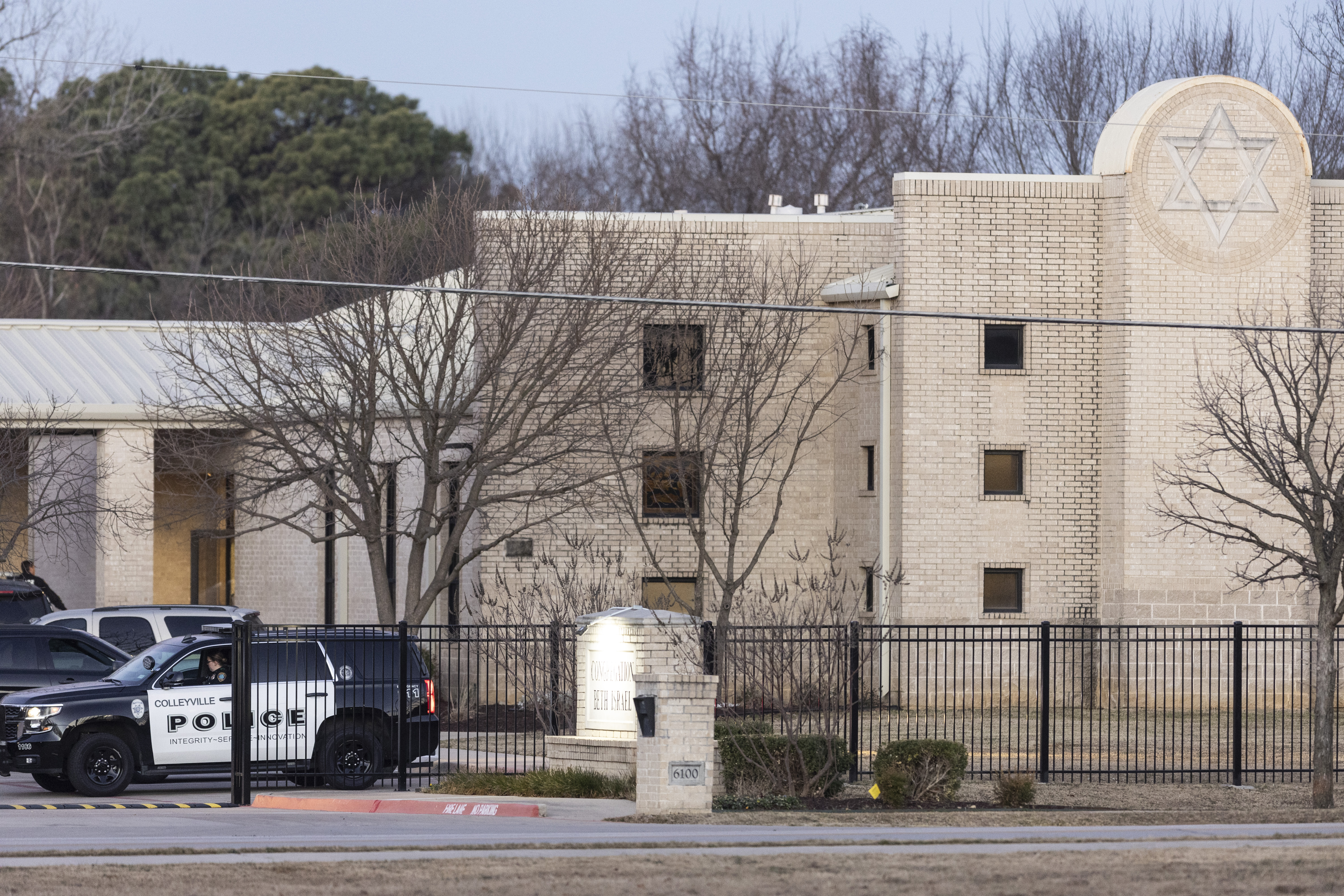The tight-knit congregation at a Texas synagogue where four people were held hostage by an armed captor during a 10-hour standoff over the weekend traces its roots back to a gathering organized over 20 years ago by a handful of families who were new to the area.
“It was a Jewish holiday and we were just feeling kind of isolated and unsure who else was living here that was Jewish,” Anna Salton Eisen, a founder and former president of Congregation Beth Israel, said Sunday.
Since that start in 1998, the congregation in the Fort Worth suburb of Colleyville has grown to about 140 families, built its own synagogue and hired a rabbi known throughout the area for building bridges with other faiths.
Eisen said she has been bowled over by the intensity of the support the congregants have gotten during the hostage ordeal, but that she also has gotten a “painful awakening” that “our history is now going to be changed.”
Get Tri-state area news delivered to your inbox. Sign up for NBC New York's News Headlines newsletter.
More Texas Synagogue Standoff Coverage
Eisen, who noted security at their synagogue has been taken “very seriously, very seriously” for a long time, said a message of support from a member the Tree of Life synagogue in Pittsburgh, where 11 worshippers were killed in a 2018 attack, made her realize “this is part of who we are and how we move forward and respond to this is something we have to think about.”
Rabbi Jeffrey Myers of Tree of Life, who survived the massacre there, America’s deadliest antisemitic attack, said in a statement that alongside the relief that the Texas hostages were safe, “my heart is heavy.”
“While everyone is physically safe, they are also forever changed,” Myers said. “My own community knows too well the pain, trauma and lost sense of security that comes when violence forces its way in, especially into our sacred spaces.”
The standoff in Texas ended around 9 p.m. Saturday when the last hostages ran out of the synagogue and an FBI SWAT team rushed in. The captor, Malik Faisal Akram, 44, was killed.
Rabbi Charlie Cytron-Walker, who was among the hostages, credited the security training his congregation had gotten over the years for getting him and the others through the ordeal.
He said in a statement they appreciated “all the love, prayers and support from our local community and throughout the world.”
“We are grateful for the outcome,” Cytron-Walker said. “We are resilient and we will recover.”
Andrew Marc Paley, a Dallas rabbi who was called to the scene to help families and hostages upon their release, said that by all accounts, Cytron-Walker was a calm and comforting presence during the ordeal.
“He made every effort to those who were with him to sort of remain calm and to, you know, diffuse the situation to the best they can,” he said.
Jawaid Alam, president of the Islamic Center of Southlake, told the Fort Worth Star-Telegram that Cytron-Walker is a personal friend who has promoted peace and cooperation across faiths.
“He is a peace-loving person, a Rabbi and Jewish leader, but a true friend of the Muslim community,” Alam said.
Cytron-Walker has been the synagogue's first full-time rabbi since 2006. The synagogue's website says the married father of two loves welcoming everyone from “interfaith families to LGBT individuals and families to those seeking to find a spiritual home in Judaism, along with all others.”
“We have newcomers, we have people who have been here a long time and have seen each other’s children grow up and have been together through all the ups and downs — the joys and hardships of life,” Eisen said. “We’re tight-knit, we’re not a very large congregation.”
Eisen said she knew they were welcome in the community, but didn't quite realize how much until the outpouring came as the ordeal unfolded.
“Now I really feel welcome here. It was a life-changing thing,” she said.
Eisen, who has been cautious about going out during the pandemic to protect her mother, a Holocaust survivor who turns 100 on Saturday, said she started watching the Facebook livestream of the hostage-taking during the services when alerted by another member.
“It felt impossible to watch and impossible not to watch,” she said.
It was especially hard, she said, to tell her mother what had happened. “It was so difficult for me because she thought this can’t happen here,” Eisen said.
Writers Paul J. Weber in Austin, Texas, and Peter Smith in Pittsburg contributed to this report.



